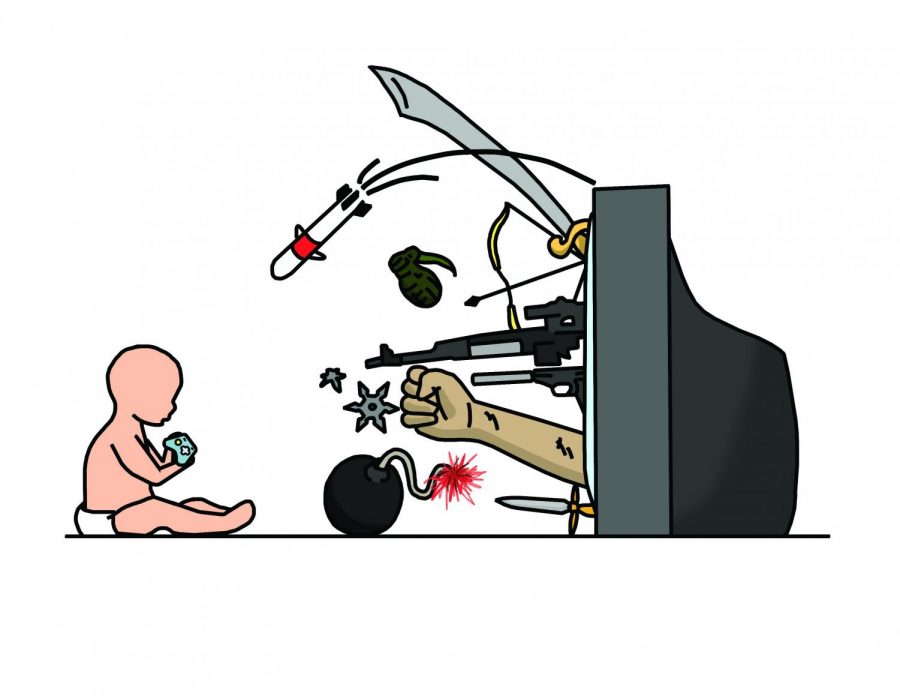Statistics disprove link between violent video games and violent behavior
The debate on whether violent video games cause violent behavior is not new. Ever since the 2011 Supreme Court case Brown v. Entertainment Merchants Association (EMA) in which a 7-2 ruling for the EMA resulted in no regulation of violent video games to minors, debate between both sides has occurred consistently. Now with the recent school shootings and outbreak of awareness about gun violence, video games have been brought to the public scene once more. With some public figures putting the blame on first-person shooter games such as “Call of Duty” or “Counter-Strike: Global Offensive” for these tragic events, a stereotype that gamers who play violent video games have aggressive behavior has risen. Despite the accusations toward these gamers, the stereotype is invalid and misleading through statistics and experiments disproving the stereotype as well as the claims of shortsighted data supporting the stereotype.
Ever since the sparked controversy, there have been multiple psychological studies and statistical analyses. An economic study by the “Southern Economic Journal” in 2016 showed that violent video games have a positive impact on society rather than a negative one. When a new video game title came out, crime rates decreased, showing a positive influence caused by video games. A possible explanation for these results is the concept that violent video games serve as a cathartic outlet for aggressiveness or rage. Furthermore, FBI statistics in 2004 displayed that about 12 percent of those who committed a crime at school also had an interest in violent video games—a figure not high enough to draw the conclusion that there is a causation between violent video games and violent behavior. A research experiment done this year by the University of York found no evidence of a correlation between violent video games and violence. The aggression levels post-video games presented no relationship between aggression and video games, proving the stereotype false. The statistics found over time and experiments on the topic don’t lie; violent video games are not the gateway to violence behavior.
A common argument for banning violent video games is the causation between violent video games and aggression, however aggression does not necessarily originate from playing video games. “The Journal of the American Medical Association” found a link between violent video gaming and aggressive behavior in 2014, and a 2014 study by “Psychology of Popular Media Culture” journal displayed that 90% of pediatricians agreed that violent video games increase violent behavior among children. While the studies may be true, they fail to depict the full scene. There are various other factors that affect aggression and are hard to isolate, such as mental health and family history. People who enjoy violent video games may already be interested in violence, hence why they enjoy them to begin with. Associate professor of sociology at Western Michigan University Whitney DeCamp says that the evidence supporting the stereotype shows an insignificant link at best. “Kids who like to play brutal video games have a predisposition toward aggression,” DeCamp said. There are too many variables to claim that video games are the cause of higher aggression levels accurately.
Banning video games will not eradicate violent or aggressive behavior, nor will it significantly decrease the number of crimes or shootings occurring in the United States. Reinforcing the stereotype through scapegoating violent video games when real life violence occurs and placing blame on the gamers themselves is dangerously misleading. Being aware of the stereotype also helps create less stigma towards gamers, for a more unbiased view is created. Although it seems that the world is more violent, the blame doesn’t go to entertainment even though it may seem intuitive to think so. Video games are not the problem, despite the popular belief otherwise.
Your donation will support the student journalists of Henry M. Gunn High School. Your contribution will allow us to purchase equipment and cover our annual website hosting costs.




